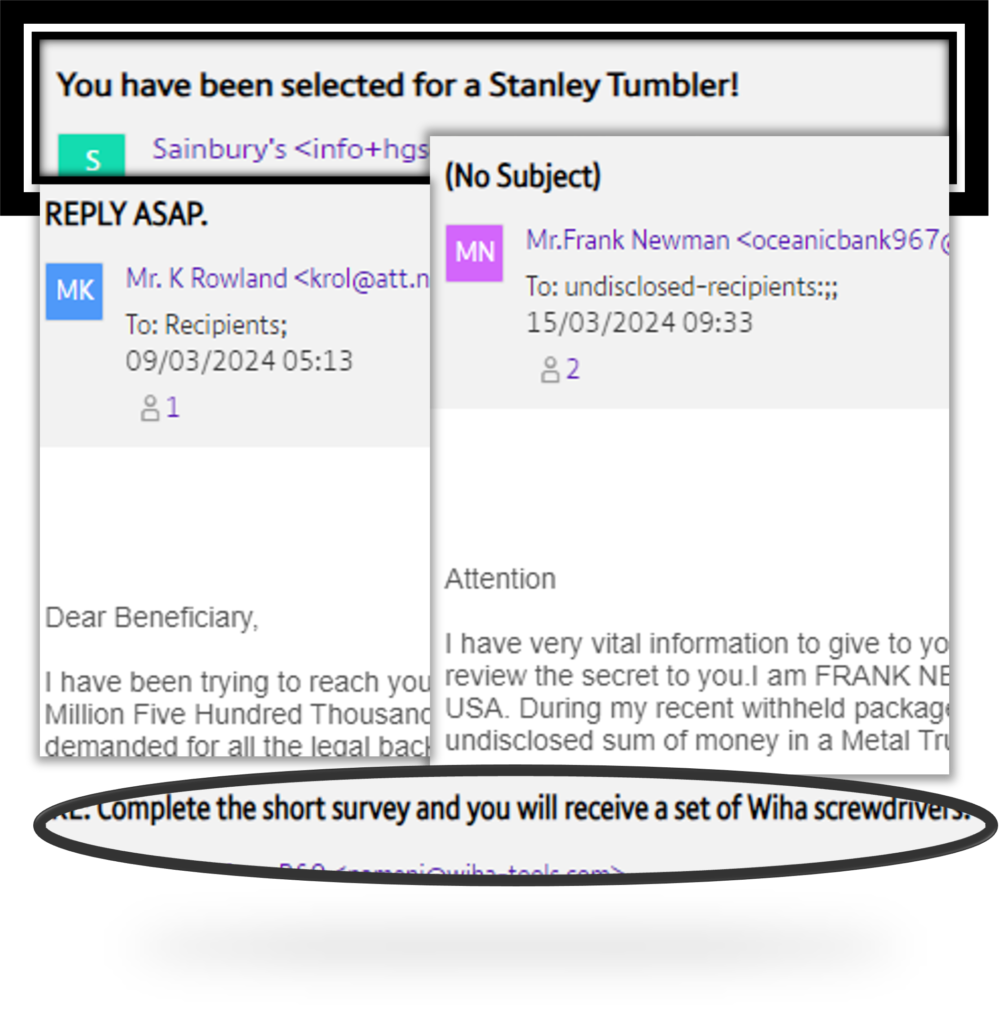
It’s not always about a fake outstanding email bill from a fake source that you have to watch out for. There are other tactics scammers use to try and get you to absent-mindedly click through on a fake email. If you understand that it’s not always about giving your personal details or actually paying for something, then you will certainly understand why I often warn people to always check a link before you click.
If you don’t check because you think it’s not asking for money or details and it doesn’t harm to have a look at an offer… think again. You may have just accidentally added your email address to a ‘Sucker’ list! Seems harmless enough, but this is where the scammer can then sell your newly harvested email address details on to others who may have more persuasive / emotional / engaging emails who will then start sending you email after email with the aim of getting you to part with your money, your details, your heart or all 3!
We’ve all heard of the modern online romance scams and are pretty much getting used to people coming forward and highlighting how this crime has impacted them and their loved ones. After all, it’s no longer seen as a one off. Nor the victim seen as a silly person. We accept that it’s embarrassing and know they are not the only one who suffered from this. There are help groups and schemes for those that have fallen prey to the scammers. Be it their identity stolen to woo the unsuspecting or the unsuspecting not realising they are being scammed.
Stopping a Scam Doesn’t End the Threat…
Being scammed is every where and easy to fall into if you don’t stay cynical. Only yesterday I was chatting to someone on WhatsApp regarding a group we both belonged too. I am a ‘Lurker’ of groups. One of my Super Connector Friends, Marc Jarrett, calls me his ‘Super Lurker’ because I don’t tend to post much, but I do like to keep an eye on the messages and follow the conversation…. On March the 10th, I was added to a group calling itself – Bitcoin VIP Group 2! Always fascinated by Bitcoin but too stubborn to do it without going through the proper channels and suspected this was a scam, I thought I’d watch for a while. And so I stayed instead of leaving immediately….
Within a few days, I saw how the ‘Group’ was being operated – ‘The Trader’ opening up the deal for everyone to pile in to buy bitcoin in a 15 minute window hoping the value would go up before closing the purchase window. Afterwards, there would be a flurry of uploads of what the bitcoin investors had supposedly made in that 15 minute window. Some made $165 on their $500 investment, others a few dollars more. Always one person showing they made a small loss because they do exactly what the Trader told them to do and then usually two or three saying they want to put more money than $500 in next time to make bigger wins. All sounded exciting, enticing even… but the cynic in me stood firm! And glad I am that it did.
While the cheerleaders were making themselves obvious that they too were part of the scam setup with the so called Trader in charge and buying when the ‘Analyst’ said now was the time to buy, I noticed a few messages starting to pop up asking about making withdrawals. No one really come back apart from one obvious cheerleader saying that it’s true in only costing $10 admin fee…
After 8 days I pounced and asked 3 of the posters if they had had a response to withdrawing yet? One messaged me directly to say that they hadn’t and that when they repeatedly asked, he was told that they still needed to have his real name verified, despite him sending them a copy of his passport 6 weeks prior. They also asked him for an additional lump sum of money before they would allow him to withdraw! Classic signs of a scam unfortunately. I wasn’t surprised that only 4 hours of my posting about questioning if anyone was able to withdraw money, I was no longer a member of the group and the group has been closed by WhatsApp themselves. Whatever the group was doing was obviously wrong because WhatsApp don’t close groups unless it violates their rules!
However, the worrying thing is, the person I spoke too is now on a Sucker list. Not only did he spend money with the bitcoin fraudsters, but within 24 hours, he is now being targeted by others trying to tell him that they are the true Bitcoin sellers and traders and to do business with them instead. And then there’s his passport details he’s handed over to the fraudsters – that’s another Sucker List his details are on… as is his email address on another, his bank account on another, card details, address etc etc etc…. Poor guy.
And you know you are on a Sucker List because within a comparatively short space of time, you seem to receive more emails than normal asking you to take survey’s for prizes, buy bitcoin or lottery tickets at a discount, begging letters from someone who believes you are related or a distant relative has died and wants to give you funds or you’ve won a lottery, a holiday, a mystery prize or this that and the other….

But don’t be misled into thinking you need to actually buy or partake in activity like my contact with their Bitcoin experience above either before you get caught and put on a Sucker list. The scammers are getting so clever nowadays with Spoofing and phishing and that’s before AI’s involvement being incorporated into their schemes.
Nowadays, you don’t need to actually have filled in any details or paid any money before you are bombarded with fake after fake email. It’s enough that you once followed a link in a dodgy email to a dodgy website which now means you are in someone’s database. And they are now selling your email on to someone else as a ‘potential’ target, who will send loads of emails hoping that one of the many they send might just catch your eye enough for you to part with your money and details.
In the example “Second fake email” in one of my other articles, How To Spot The Scam Email Targeting Seniors , the spoof ‘renewal’ link in the email contained tracking details so just by following the link to the fake site, they would know which email address triggered the visit. And because they are sending out TV Licence fake emails, it’s well known that many Seniors are used to this annual debt and diligently pay as we do usually like to pay our TV Licence even if we grumble while we do! But this is how many Seniors become targets of fake, spam and nuisance communication as they end up on The Sucker List!
Unfortunately, once on it, there isn’t much you can do apart from report them all, move them into your spam folder and let your email provider do the rest.
As Sucker lists are hard to track, there isn’t much you can do about the amount of spam and fake emails you get. Your email provider works hard to stop what they can, so you have to help them by telling them what is and isn’t spam.
At times it can be overwhelming, but when you don’t have anyone to talk to, what can you do? At least reporting how many you are getting to your email provider and The National Cyber Security Centre is a step forward. In 2023, phishing scams accounted for 44% of incidents of Cyber attacks. UK residents received over 208 million scam emails but only 69,000 cases of identity theft were reported. Remember, you are not alone. But you do need to remain vigilant.
If you get overwhelmed with fake emails, reach out to a friend or family member or even Citizen Advice Bureau on their helpline 0808 223 1133, or contact one of the groups mentioned below.
Always stay cynical when reading any email talking about personal details or about money.
Being cynical will make you double check the sender’s details even when you believe it’s from a genuine source. It also makes you double check the links and the spelling of the links too!
The fake emails are getting better at masking link and email details, so if in doubt never click on any links. Instead, always go direct to the website and log in rather than follow links.
What to do once you know it’s fake:
Every time we get one of these fake email, Whatsapp, texts, we report them. The best place to report them are:
- Action Fraud: https://www.actionfraud.police.uk/ or call them on 0300 123 2040 – especially if you have already given personal detail
- Call your bank immediately if you’ve given any account details using the number on the back of your card or on the documents they send.
- Report fake emails to the government agency – National Cyber Security Centre (https://www.ncsc.gov.uk/). Forward fake emails to: report@phishing.gov.uk
- Not fake but fed up of receiving constant marketing messages even if you’ve asked them to stop and unsubscribed? Then contact: Information Commissioner’s Office (ICO) as they are always interested in stopping organisations who are not following the rules around direct marketing. https://ico.org.uk/make-a-complaint/nuisance-calls-and-messages/spam-emails/
- Got a fake text on your mobile phone message – then forward the text message to 7726, which spells SPAM. This goes to the National Cyber Security Centre. They will text back and ask for further details about the message only. They don’t ask for personal info.
- Had a WhatsApp message which is obviously fake? Help WhatsApp stamp these guys out too by simply Opening the chat with the contact you want to report, tap the 3 dots in the top right corner, select More from the drop down, then pick Report.
- Most social platforms have a similar easy way to report fake accounts and messages like Whatsapp. So when you have a fake, get reporting!
Remember, while all the different ways of communicating are making it easier for us all to connect with businesses, friends and family, it’s also making it easier for us all to become targets to those that would rather steal from us be it money or our identity.
Be safe, be cynical and take care.
Cindy – aka Cynical Sid!

